Cross-Cultural Management: IJV Challenges Between Australia and China
VerifiedAdded on 2022/11/28
|12
|3198
|200
Report
AI Summary
This report examines the cross-cultural management challenges within an International Joint Venture (IJV) between an Australian infrastructure company (InfraCo) and a Chinese manufacturing company (ManuCo), named RailCo. The report delves into the cultural dynamics influencing the IJV's success, particularly the differences between Australian and Chinese cultures, analyzed through Hofstede's cultural dimensions. It highlights potential conflicts and suggests negotiated practices for resolution. Furthermore, the report addresses the preparation required for an Australian senior leader managing the venture in China, including recommendations for enhancing the expatriate's skills and ensuring the IJV's productivity. The report emphasizes the importance of understanding cultural nuances, communication barriers, and the need for effective international human resource management to foster a successful and productive international business environment.
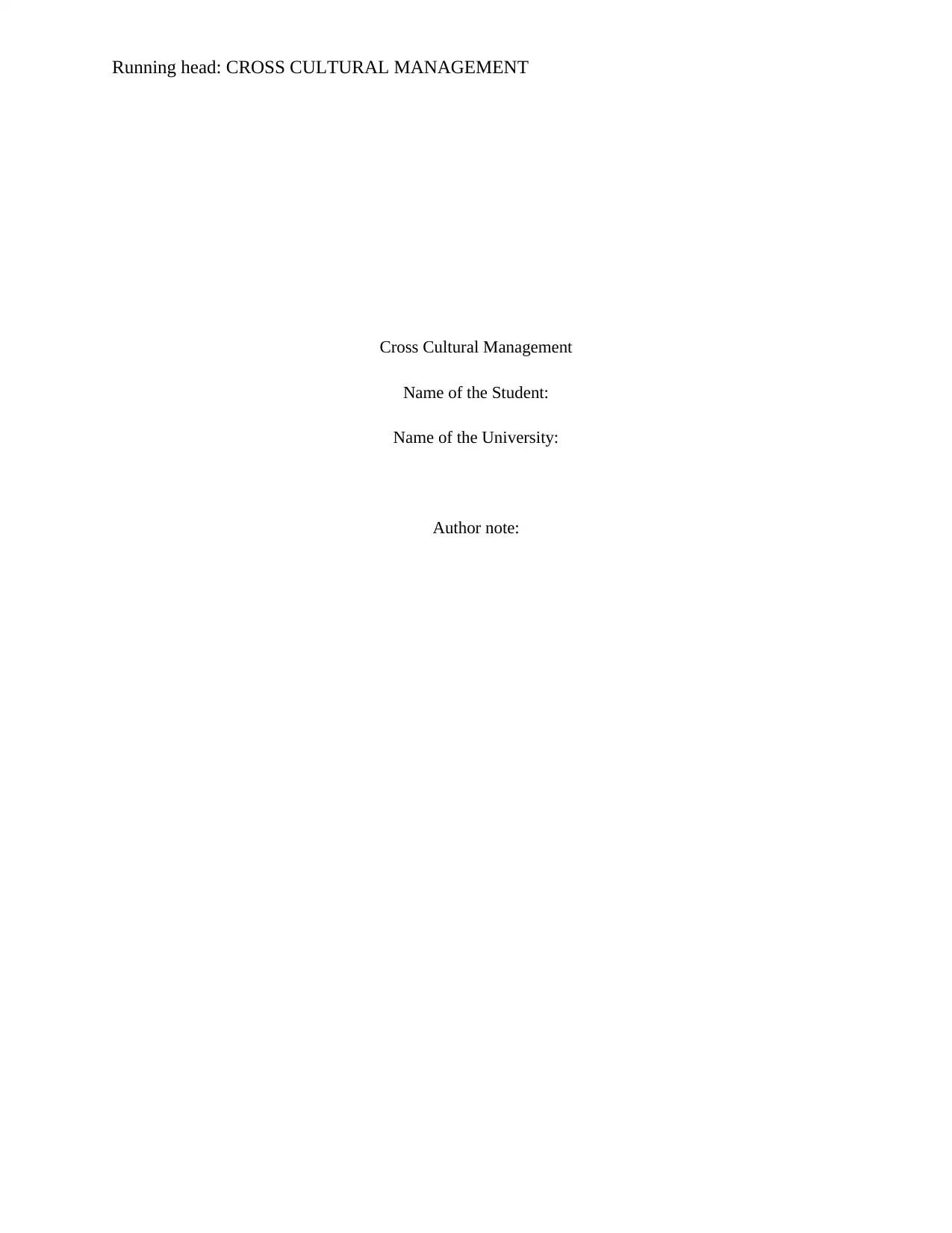
Running head: CROSS CULTURAL MANAGEMENT
Cross Cultural Management
Name of the Student:
Name of the University:
Author note:
Cross Cultural Management
Name of the Student:
Name of the University:
Author note:
Paraphrase This Document
Need a fresh take? Get an instant paraphrase of this document with our AI Paraphraser
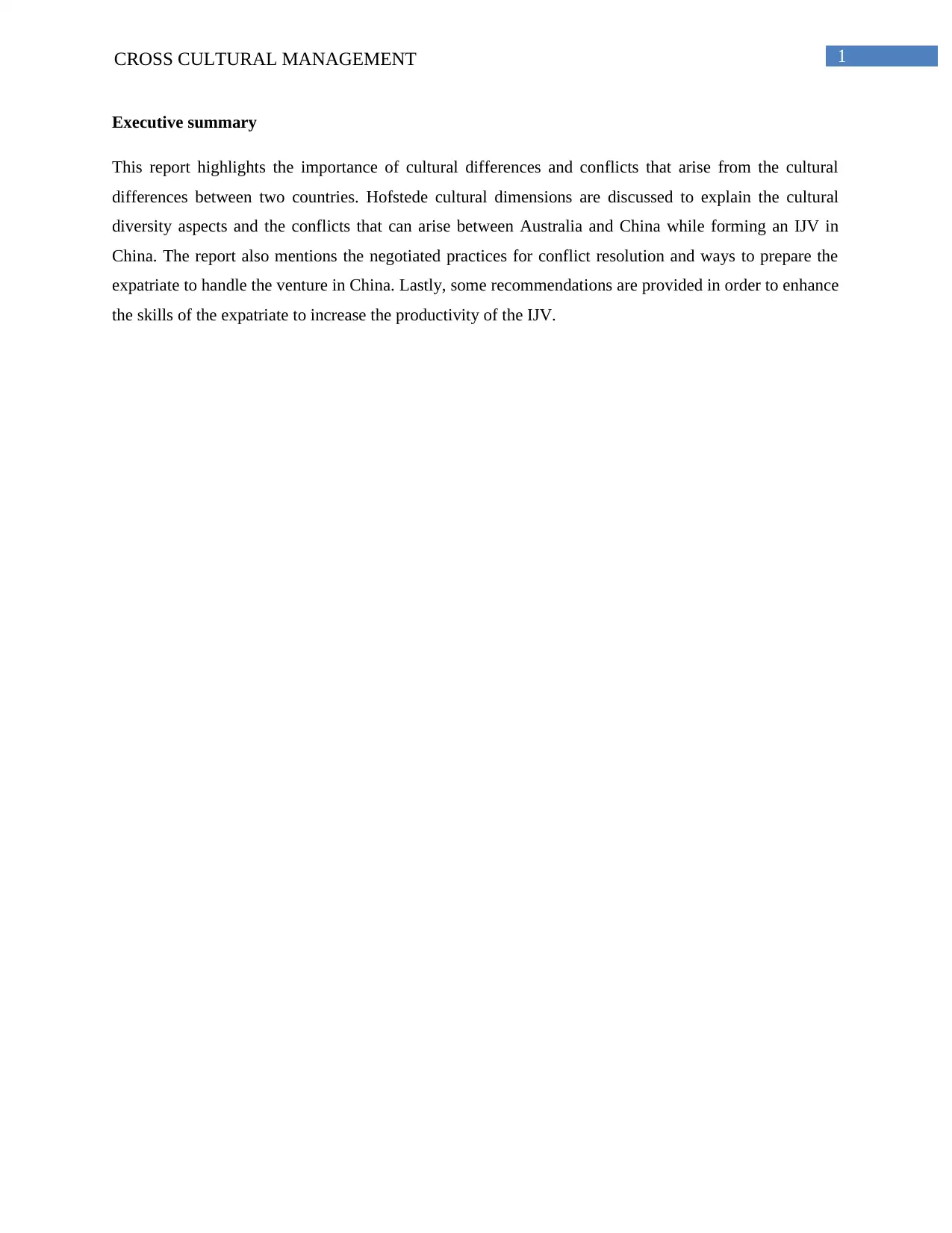
1CROSS CULTURAL MANAGEMENT
Executive summary
This report highlights the importance of cultural differences and conflicts that arise from the cultural
differences between two countries. Hofstede cultural dimensions are discussed to explain the cultural
diversity aspects and the conflicts that can arise between Australia and China while forming an IJV in
China. The report also mentions the negotiated practices for conflict resolution and ways to prepare the
expatriate to handle the venture in China. Lastly, some recommendations are provided in order to enhance
the skills of the expatriate to increase the productivity of the IJV.
Executive summary
This report highlights the importance of cultural differences and conflicts that arise from the cultural
differences between two countries. Hofstede cultural dimensions are discussed to explain the cultural
diversity aspects and the conflicts that can arise between Australia and China while forming an IJV in
China. The report also mentions the negotiated practices for conflict resolution and ways to prepare the
expatriate to handle the venture in China. Lastly, some recommendations are provided in order to enhance
the skills of the expatriate to increase the productivity of the IJV.
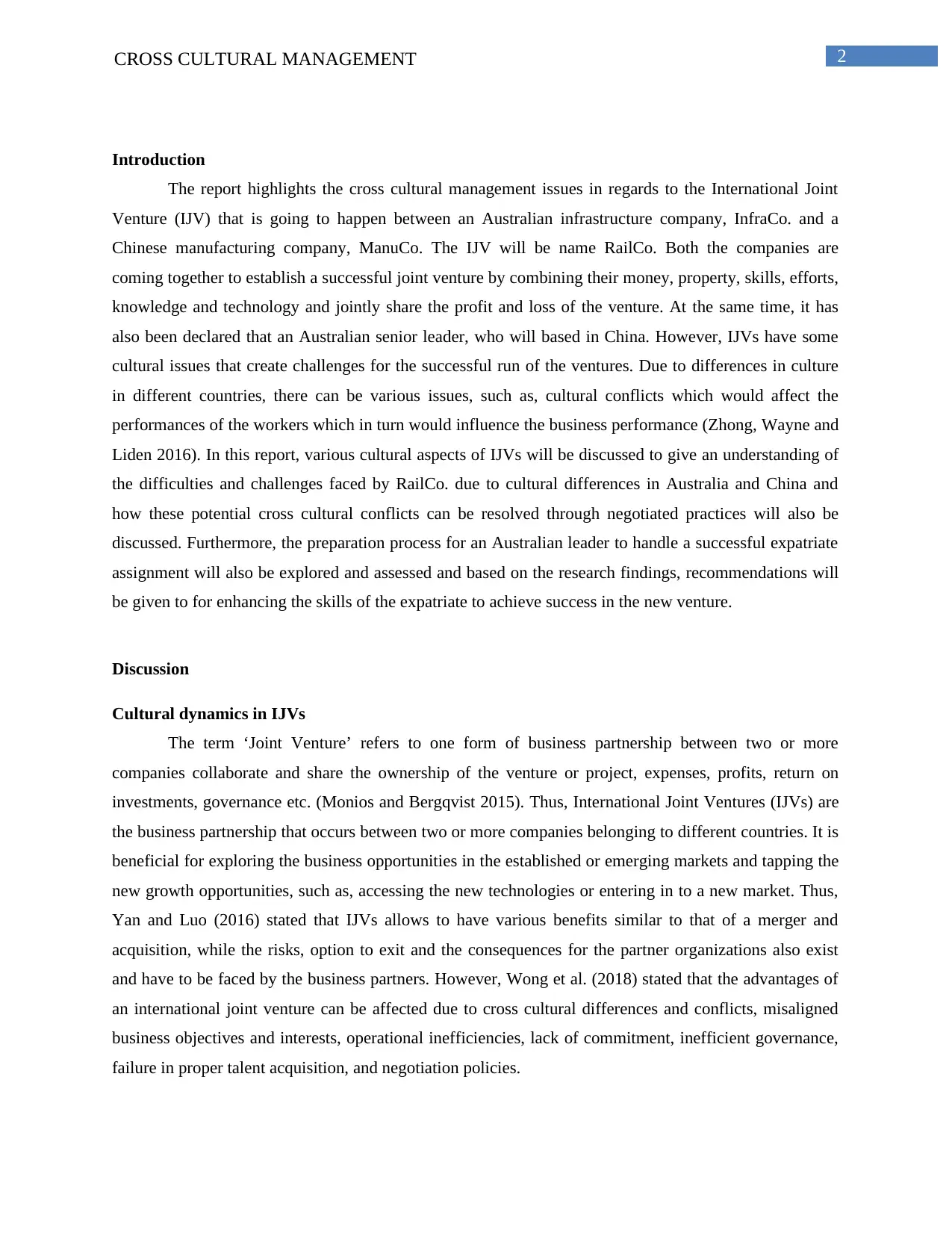
2CROSS CULTURAL MANAGEMENT
Introduction
The report highlights the cross cultural management issues in regards to the International Joint
Venture (IJV) that is going to happen between an Australian infrastructure company, InfraCo. and a
Chinese manufacturing company, ManuCo. The IJV will be name RailCo. Both the companies are
coming together to establish a successful joint venture by combining their money, property, skills, efforts,
knowledge and technology and jointly share the profit and loss of the venture. At the same time, it has
also been declared that an Australian senior leader, who will based in China. However, IJVs have some
cultural issues that create challenges for the successful run of the ventures. Due to differences in culture
in different countries, there can be various issues, such as, cultural conflicts which would affect the
performances of the workers which in turn would influence the business performance (Zhong, Wayne and
Liden 2016). In this report, various cultural aspects of IJVs will be discussed to give an understanding of
the difficulties and challenges faced by RailCo. due to cultural differences in Australia and China and
how these potential cross cultural conflicts can be resolved through negotiated practices will also be
discussed. Furthermore, the preparation process for an Australian leader to handle a successful expatriate
assignment will also be explored and assessed and based on the research findings, recommendations will
be given to for enhancing the skills of the expatriate to achieve success in the new venture.
Discussion
Cultural dynamics in IJVs
The term ‘Joint Venture’ refers to one form of business partnership between two or more
companies collaborate and share the ownership of the venture or project, expenses, profits, return on
investments, governance etc. (Monios and Bergqvist 2015). Thus, International Joint Ventures (IJVs) are
the business partnership that occurs between two or more companies belonging to different countries. It is
beneficial for exploring the business opportunities in the established or emerging markets and tapping the
new growth opportunities, such as, accessing the new technologies or entering in to a new market. Thus,
Yan and Luo (2016) stated that IJVs allows to have various benefits similar to that of a merger and
acquisition, while the risks, option to exit and the consequences for the partner organizations also exist
and have to be faced by the business partners. However, Wong et al. (2018) stated that the advantages of
an international joint venture can be affected due to cross cultural differences and conflicts, misaligned
business objectives and interests, operational inefficiencies, lack of commitment, inefficient governance,
failure in proper talent acquisition, and negotiation policies.
Introduction
The report highlights the cross cultural management issues in regards to the International Joint
Venture (IJV) that is going to happen between an Australian infrastructure company, InfraCo. and a
Chinese manufacturing company, ManuCo. The IJV will be name RailCo. Both the companies are
coming together to establish a successful joint venture by combining their money, property, skills, efforts,
knowledge and technology and jointly share the profit and loss of the venture. At the same time, it has
also been declared that an Australian senior leader, who will based in China. However, IJVs have some
cultural issues that create challenges for the successful run of the ventures. Due to differences in culture
in different countries, there can be various issues, such as, cultural conflicts which would affect the
performances of the workers which in turn would influence the business performance (Zhong, Wayne and
Liden 2016). In this report, various cultural aspects of IJVs will be discussed to give an understanding of
the difficulties and challenges faced by RailCo. due to cultural differences in Australia and China and
how these potential cross cultural conflicts can be resolved through negotiated practices will also be
discussed. Furthermore, the preparation process for an Australian leader to handle a successful expatriate
assignment will also be explored and assessed and based on the research findings, recommendations will
be given to for enhancing the skills of the expatriate to achieve success in the new venture.
Discussion
Cultural dynamics in IJVs
The term ‘Joint Venture’ refers to one form of business partnership between two or more
companies collaborate and share the ownership of the venture or project, expenses, profits, return on
investments, governance etc. (Monios and Bergqvist 2015). Thus, International Joint Ventures (IJVs) are
the business partnership that occurs between two or more companies belonging to different countries. It is
beneficial for exploring the business opportunities in the established or emerging markets and tapping the
new growth opportunities, such as, accessing the new technologies or entering in to a new market. Thus,
Yan and Luo (2016) stated that IJVs allows to have various benefits similar to that of a merger and
acquisition, while the risks, option to exit and the consequences for the partner organizations also exist
and have to be faced by the business partners. However, Wong et al. (2018) stated that the advantages of
an international joint venture can be affected due to cross cultural differences and conflicts, misaligned
business objectives and interests, operational inefficiencies, lack of commitment, inefficient governance,
failure in proper talent acquisition, and negotiation policies.
⊘ This is a preview!⊘
Do you want full access?
Subscribe today to unlock all pages.

Trusted by 1+ million students worldwide
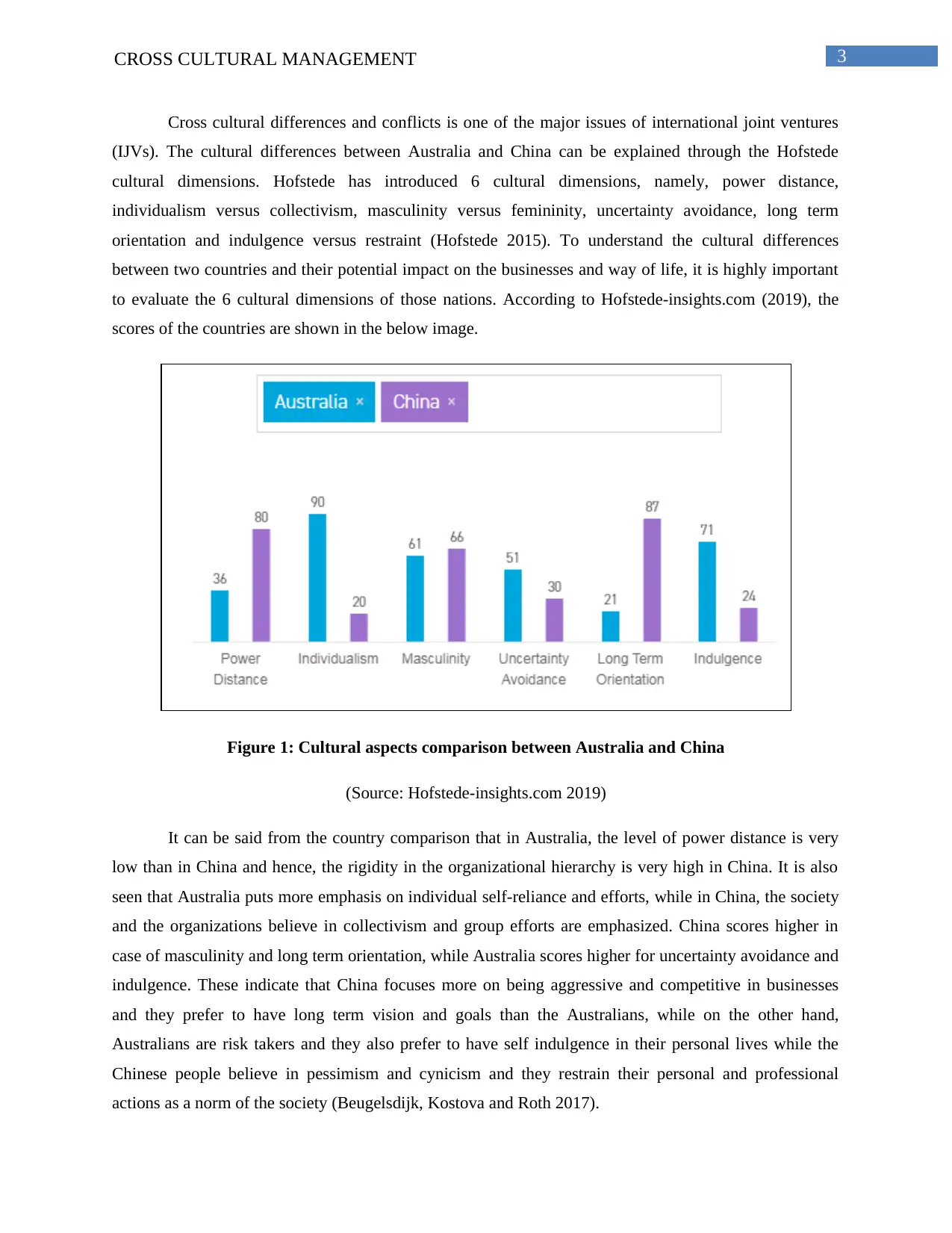
3CROSS CULTURAL MANAGEMENT
Cross cultural differences and conflicts is one of the major issues of international joint ventures
(IJVs). The cultural differences between Australia and China can be explained through the Hofstede
cultural dimensions. Hofstede has introduced 6 cultural dimensions, namely, power distance,
individualism versus collectivism, masculinity versus femininity, uncertainty avoidance, long term
orientation and indulgence versus restraint (Hofstede 2015). To understand the cultural differences
between two countries and their potential impact on the businesses and way of life, it is highly important
to evaluate the 6 cultural dimensions of those nations. According to Hofstede-insights.com (2019), the
scores of the countries are shown in the below image.
Figure 1: Cultural aspects comparison between Australia and China
(Source: Hofstede-insights.com 2019)
It can be said from the country comparison that in Australia, the level of power distance is very
low than in China and hence, the rigidity in the organizational hierarchy is very high in China. It is also
seen that Australia puts more emphasis on individual self-reliance and efforts, while in China, the society
and the organizations believe in collectivism and group efforts are emphasized. China scores higher in
case of masculinity and long term orientation, while Australia scores higher for uncertainty avoidance and
indulgence. These indicate that China focuses more on being aggressive and competitive in businesses
and they prefer to have long term vision and goals than the Australians, while on the other hand,
Australians are risk takers and they also prefer to have self indulgence in their personal lives while the
Chinese people believe in pessimism and cynicism and they restrain their personal and professional
actions as a norm of the society (Beugelsdijk, Kostova and Roth 2017).
Cross cultural differences and conflicts is one of the major issues of international joint ventures
(IJVs). The cultural differences between Australia and China can be explained through the Hofstede
cultural dimensions. Hofstede has introduced 6 cultural dimensions, namely, power distance,
individualism versus collectivism, masculinity versus femininity, uncertainty avoidance, long term
orientation and indulgence versus restraint (Hofstede 2015). To understand the cultural differences
between two countries and their potential impact on the businesses and way of life, it is highly important
to evaluate the 6 cultural dimensions of those nations. According to Hofstede-insights.com (2019), the
scores of the countries are shown in the below image.
Figure 1: Cultural aspects comparison between Australia and China
(Source: Hofstede-insights.com 2019)
It can be said from the country comparison that in Australia, the level of power distance is very
low than in China and hence, the rigidity in the organizational hierarchy is very high in China. It is also
seen that Australia puts more emphasis on individual self-reliance and efforts, while in China, the society
and the organizations believe in collectivism and group efforts are emphasized. China scores higher in
case of masculinity and long term orientation, while Australia scores higher for uncertainty avoidance and
indulgence. These indicate that China focuses more on being aggressive and competitive in businesses
and they prefer to have long term vision and goals than the Australians, while on the other hand,
Australians are risk takers and they also prefer to have self indulgence in their personal lives while the
Chinese people believe in pessimism and cynicism and they restrain their personal and professional
actions as a norm of the society (Beugelsdijk, Kostova and Roth 2017).
Paraphrase This Document
Need a fresh take? Get an instant paraphrase of this document with our AI Paraphraser
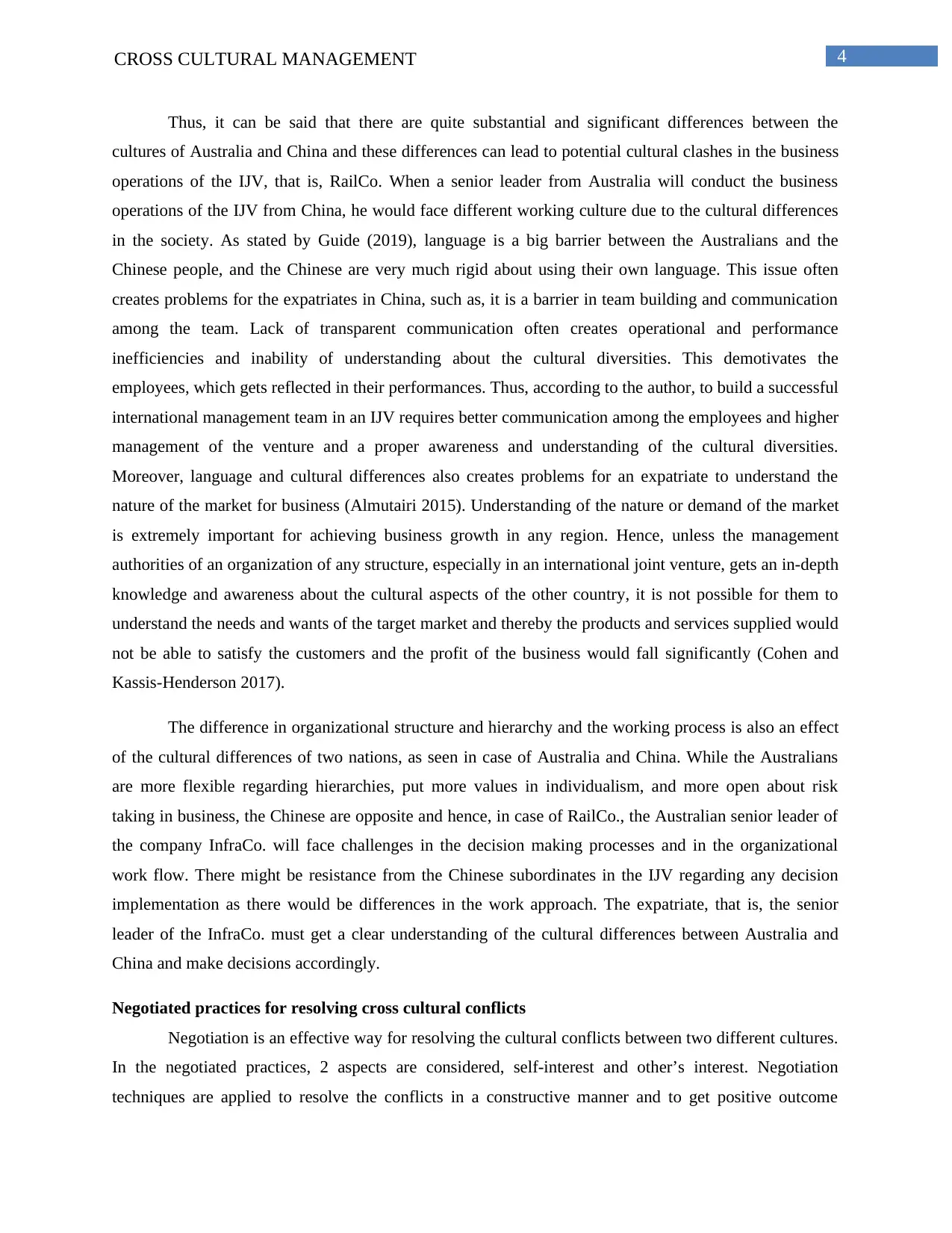
4CROSS CULTURAL MANAGEMENT
Thus, it can be said that there are quite substantial and significant differences between the
cultures of Australia and China and these differences can lead to potential cultural clashes in the business
operations of the IJV, that is, RailCo. When a senior leader from Australia will conduct the business
operations of the IJV from China, he would face different working culture due to the cultural differences
in the society. As stated by Guide (2019), language is a big barrier between the Australians and the
Chinese people, and the Chinese are very much rigid about using their own language. This issue often
creates problems for the expatriates in China, such as, it is a barrier in team building and communication
among the team. Lack of transparent communication often creates operational and performance
inefficiencies and inability of understanding about the cultural diversities. This demotivates the
employees, which gets reflected in their performances. Thus, according to the author, to build a successful
international management team in an IJV requires better communication among the employees and higher
management of the venture and a proper awareness and understanding of the cultural diversities.
Moreover, language and cultural differences also creates problems for an expatriate to understand the
nature of the market for business (Almutairi 2015). Understanding of the nature or demand of the market
is extremely important for achieving business growth in any region. Hence, unless the management
authorities of an organization of any structure, especially in an international joint venture, gets an in-depth
knowledge and awareness about the cultural aspects of the other country, it is not possible for them to
understand the needs and wants of the target market and thereby the products and services supplied would
not be able to satisfy the customers and the profit of the business would fall significantly (Cohen and
Kassis-Henderson 2017).
The difference in organizational structure and hierarchy and the working process is also an effect
of the cultural differences of two nations, as seen in case of Australia and China. While the Australians
are more flexible regarding hierarchies, put more values in individualism, and more open about risk
taking in business, the Chinese are opposite and hence, in case of RailCo., the Australian senior leader of
the company InfraCo. will face challenges in the decision making processes and in the organizational
work flow. There might be resistance from the Chinese subordinates in the IJV regarding any decision
implementation as there would be differences in the work approach. The expatriate, that is, the senior
leader of the InfraCo. must get a clear understanding of the cultural differences between Australia and
China and make decisions accordingly.
Negotiated practices for resolving cross cultural conflicts
Negotiation is an effective way for resolving the cultural conflicts between two different cultures.
In the negotiated practices, 2 aspects are considered, self-interest and other’s interest. Negotiation
techniques are applied to resolve the conflicts in a constructive manner and to get positive outcome
Thus, it can be said that there are quite substantial and significant differences between the
cultures of Australia and China and these differences can lead to potential cultural clashes in the business
operations of the IJV, that is, RailCo. When a senior leader from Australia will conduct the business
operations of the IJV from China, he would face different working culture due to the cultural differences
in the society. As stated by Guide (2019), language is a big barrier between the Australians and the
Chinese people, and the Chinese are very much rigid about using their own language. This issue often
creates problems for the expatriates in China, such as, it is a barrier in team building and communication
among the team. Lack of transparent communication often creates operational and performance
inefficiencies and inability of understanding about the cultural diversities. This demotivates the
employees, which gets reflected in their performances. Thus, according to the author, to build a successful
international management team in an IJV requires better communication among the employees and higher
management of the venture and a proper awareness and understanding of the cultural diversities.
Moreover, language and cultural differences also creates problems for an expatriate to understand the
nature of the market for business (Almutairi 2015). Understanding of the nature or demand of the market
is extremely important for achieving business growth in any region. Hence, unless the management
authorities of an organization of any structure, especially in an international joint venture, gets an in-depth
knowledge and awareness about the cultural aspects of the other country, it is not possible for them to
understand the needs and wants of the target market and thereby the products and services supplied would
not be able to satisfy the customers and the profit of the business would fall significantly (Cohen and
Kassis-Henderson 2017).
The difference in organizational structure and hierarchy and the working process is also an effect
of the cultural differences of two nations, as seen in case of Australia and China. While the Australians
are more flexible regarding hierarchies, put more values in individualism, and more open about risk
taking in business, the Chinese are opposite and hence, in case of RailCo., the Australian senior leader of
the company InfraCo. will face challenges in the decision making processes and in the organizational
work flow. There might be resistance from the Chinese subordinates in the IJV regarding any decision
implementation as there would be differences in the work approach. The expatriate, that is, the senior
leader of the InfraCo. must get a clear understanding of the cultural differences between Australia and
China and make decisions accordingly.
Negotiated practices for resolving cross cultural conflicts
Negotiation is an effective way for resolving the cultural conflicts between two different cultures.
In the negotiated practices, 2 aspects are considered, self-interest and other’s interest. Negotiation
techniques are applied to resolve the conflicts in a constructive manner and to get positive outcome
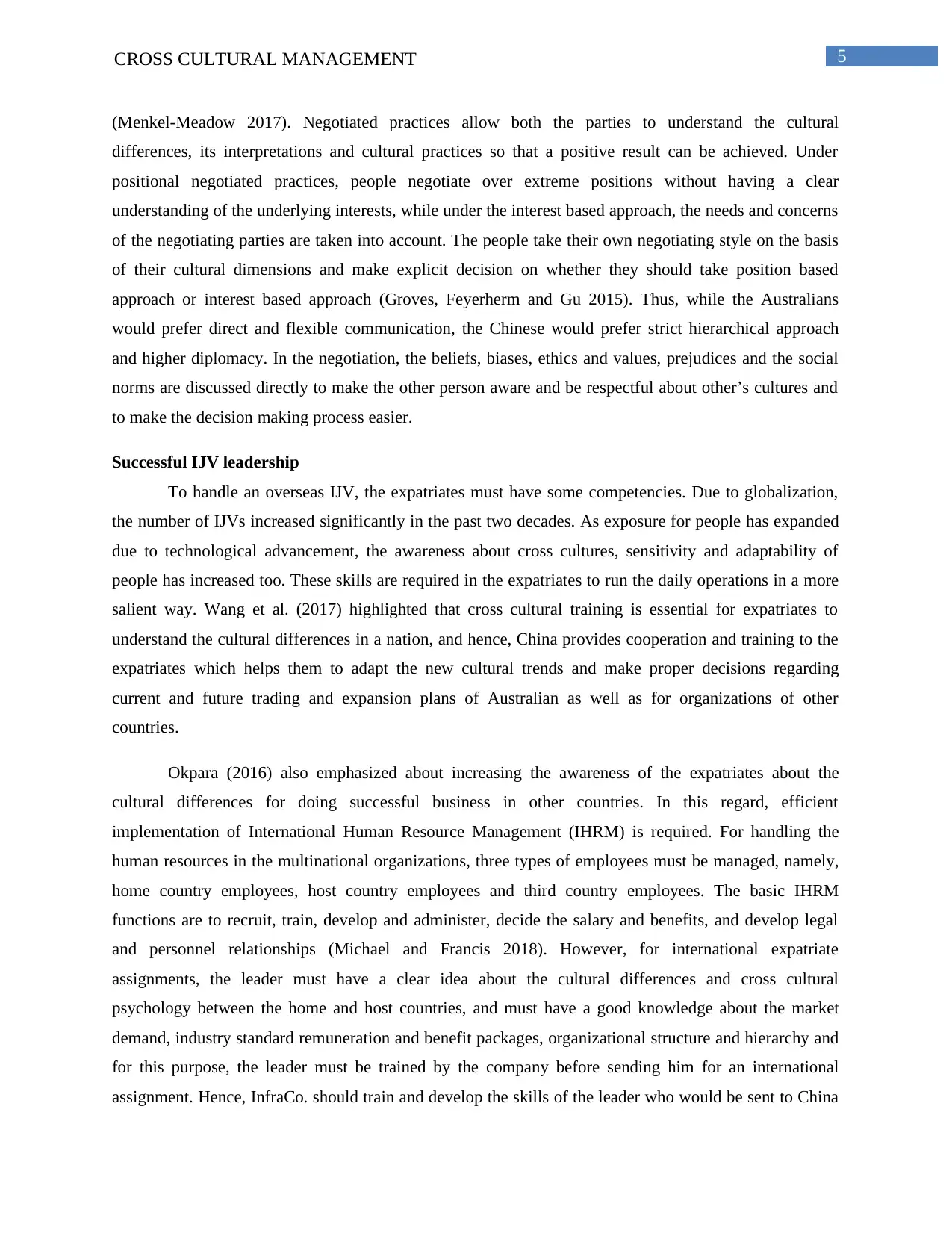
5CROSS CULTURAL MANAGEMENT
(Menkel-Meadow 2017). Negotiated practices allow both the parties to understand the cultural
differences, its interpretations and cultural practices so that a positive result can be achieved. Under
positional negotiated practices, people negotiate over extreme positions without having a clear
understanding of the underlying interests, while under the interest based approach, the needs and concerns
of the negotiating parties are taken into account. The people take their own negotiating style on the basis
of their cultural dimensions and make explicit decision on whether they should take position based
approach or interest based approach (Groves, Feyerherm and Gu 2015). Thus, while the Australians
would prefer direct and flexible communication, the Chinese would prefer strict hierarchical approach
and higher diplomacy. In the negotiation, the beliefs, biases, ethics and values, prejudices and the social
norms are discussed directly to make the other person aware and be respectful about other’s cultures and
to make the decision making process easier.
Successful IJV leadership
To handle an overseas IJV, the expatriates must have some competencies. Due to globalization,
the number of IJVs increased significantly in the past two decades. As exposure for people has expanded
due to technological advancement, the awareness about cross cultures, sensitivity and adaptability of
people has increased too. These skills are required in the expatriates to run the daily operations in a more
salient way. Wang et al. (2017) highlighted that cross cultural training is essential for expatriates to
understand the cultural differences in a nation, and hence, China provides cooperation and training to the
expatriates which helps them to adapt the new cultural trends and make proper decisions regarding
current and future trading and expansion plans of Australian as well as for organizations of other
countries.
Okpara (2016) also emphasized about increasing the awareness of the expatriates about the
cultural differences for doing successful business in other countries. In this regard, efficient
implementation of International Human Resource Management (IHRM) is required. For handling the
human resources in the multinational organizations, three types of employees must be managed, namely,
home country employees, host country employees and third country employees. The basic IHRM
functions are to recruit, train, develop and administer, decide the salary and benefits, and develop legal
and personnel relationships (Michael and Francis 2018). However, for international expatriate
assignments, the leader must have a clear idea about the cultural differences and cross cultural
psychology between the home and host countries, and must have a good knowledge about the market
demand, industry standard remuneration and benefit packages, organizational structure and hierarchy and
for this purpose, the leader must be trained by the company before sending him for an international
assignment. Hence, InfraCo. should train and develop the skills of the leader who would be sent to China
(Menkel-Meadow 2017). Negotiated practices allow both the parties to understand the cultural
differences, its interpretations and cultural practices so that a positive result can be achieved. Under
positional negotiated practices, people negotiate over extreme positions without having a clear
understanding of the underlying interests, while under the interest based approach, the needs and concerns
of the negotiating parties are taken into account. The people take their own negotiating style on the basis
of their cultural dimensions and make explicit decision on whether they should take position based
approach or interest based approach (Groves, Feyerherm and Gu 2015). Thus, while the Australians
would prefer direct and flexible communication, the Chinese would prefer strict hierarchical approach
and higher diplomacy. In the negotiation, the beliefs, biases, ethics and values, prejudices and the social
norms are discussed directly to make the other person aware and be respectful about other’s cultures and
to make the decision making process easier.
Successful IJV leadership
To handle an overseas IJV, the expatriates must have some competencies. Due to globalization,
the number of IJVs increased significantly in the past two decades. As exposure for people has expanded
due to technological advancement, the awareness about cross cultures, sensitivity and adaptability of
people has increased too. These skills are required in the expatriates to run the daily operations in a more
salient way. Wang et al. (2017) highlighted that cross cultural training is essential for expatriates to
understand the cultural differences in a nation, and hence, China provides cooperation and training to the
expatriates which helps them to adapt the new cultural trends and make proper decisions regarding
current and future trading and expansion plans of Australian as well as for organizations of other
countries.
Okpara (2016) also emphasized about increasing the awareness of the expatriates about the
cultural differences for doing successful business in other countries. In this regard, efficient
implementation of International Human Resource Management (IHRM) is required. For handling the
human resources in the multinational organizations, three types of employees must be managed, namely,
home country employees, host country employees and third country employees. The basic IHRM
functions are to recruit, train, develop and administer, decide the salary and benefits, and develop legal
and personnel relationships (Michael and Francis 2018). However, for international expatriate
assignments, the leader must have a clear idea about the cultural differences and cross cultural
psychology between the home and host countries, and must have a good knowledge about the market
demand, industry standard remuneration and benefit packages, organizational structure and hierarchy and
for this purpose, the leader must be trained by the company before sending him for an international
assignment. Hence, InfraCo. should train and develop the skills of the leader who would be sent to China
⊘ This is a preview!⊘
Do you want full access?
Subscribe today to unlock all pages.

Trusted by 1+ million students worldwide
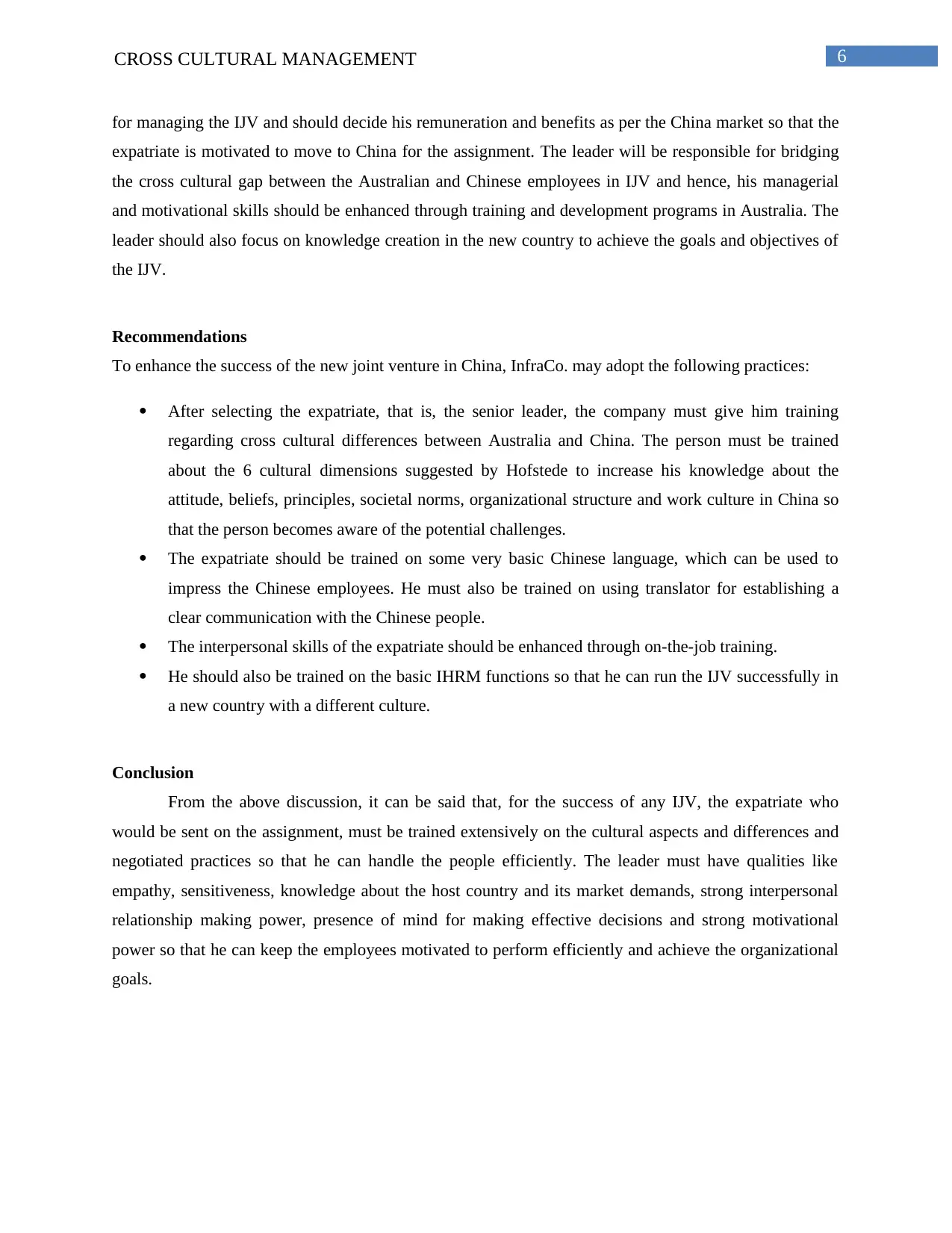
6CROSS CULTURAL MANAGEMENT
for managing the IJV and should decide his remuneration and benefits as per the China market so that the
expatriate is motivated to move to China for the assignment. The leader will be responsible for bridging
the cross cultural gap between the Australian and Chinese employees in IJV and hence, his managerial
and motivational skills should be enhanced through training and development programs in Australia. The
leader should also focus on knowledge creation in the new country to achieve the goals and objectives of
the IJV.
Recommendations
To enhance the success of the new joint venture in China, InfraCo. may adopt the following practices:
After selecting the expatriate, that is, the senior leader, the company must give him training
regarding cross cultural differences between Australia and China. The person must be trained
about the 6 cultural dimensions suggested by Hofstede to increase his knowledge about the
attitude, beliefs, principles, societal norms, organizational structure and work culture in China so
that the person becomes aware of the potential challenges.
The expatriate should be trained on some very basic Chinese language, which can be used to
impress the Chinese employees. He must also be trained on using translator for establishing a
clear communication with the Chinese people.
The interpersonal skills of the expatriate should be enhanced through on-the-job training.
He should also be trained on the basic IHRM functions so that he can run the IJV successfully in
a new country with a different culture.
Conclusion
From the above discussion, it can be said that, for the success of any IJV, the expatriate who
would be sent on the assignment, must be trained extensively on the cultural aspects and differences and
negotiated practices so that he can handle the people efficiently. The leader must have qualities like
empathy, sensitiveness, knowledge about the host country and its market demands, strong interpersonal
relationship making power, presence of mind for making effective decisions and strong motivational
power so that he can keep the employees motivated to perform efficiently and achieve the organizational
goals.
for managing the IJV and should decide his remuneration and benefits as per the China market so that the
expatriate is motivated to move to China for the assignment. The leader will be responsible for bridging
the cross cultural gap between the Australian and Chinese employees in IJV and hence, his managerial
and motivational skills should be enhanced through training and development programs in Australia. The
leader should also focus on knowledge creation in the new country to achieve the goals and objectives of
the IJV.
Recommendations
To enhance the success of the new joint venture in China, InfraCo. may adopt the following practices:
After selecting the expatriate, that is, the senior leader, the company must give him training
regarding cross cultural differences between Australia and China. The person must be trained
about the 6 cultural dimensions suggested by Hofstede to increase his knowledge about the
attitude, beliefs, principles, societal norms, organizational structure and work culture in China so
that the person becomes aware of the potential challenges.
The expatriate should be trained on some very basic Chinese language, which can be used to
impress the Chinese employees. He must also be trained on using translator for establishing a
clear communication with the Chinese people.
The interpersonal skills of the expatriate should be enhanced through on-the-job training.
He should also be trained on the basic IHRM functions so that he can run the IJV successfully in
a new country with a different culture.
Conclusion
From the above discussion, it can be said that, for the success of any IJV, the expatriate who
would be sent on the assignment, must be trained extensively on the cultural aspects and differences and
negotiated practices so that he can handle the people efficiently. The leader must have qualities like
empathy, sensitiveness, knowledge about the host country and its market demands, strong interpersonal
relationship making power, presence of mind for making effective decisions and strong motivational
power so that he can keep the employees motivated to perform efficiently and achieve the organizational
goals.
Paraphrase This Document
Need a fresh take? Get an instant paraphrase of this document with our AI Paraphraser
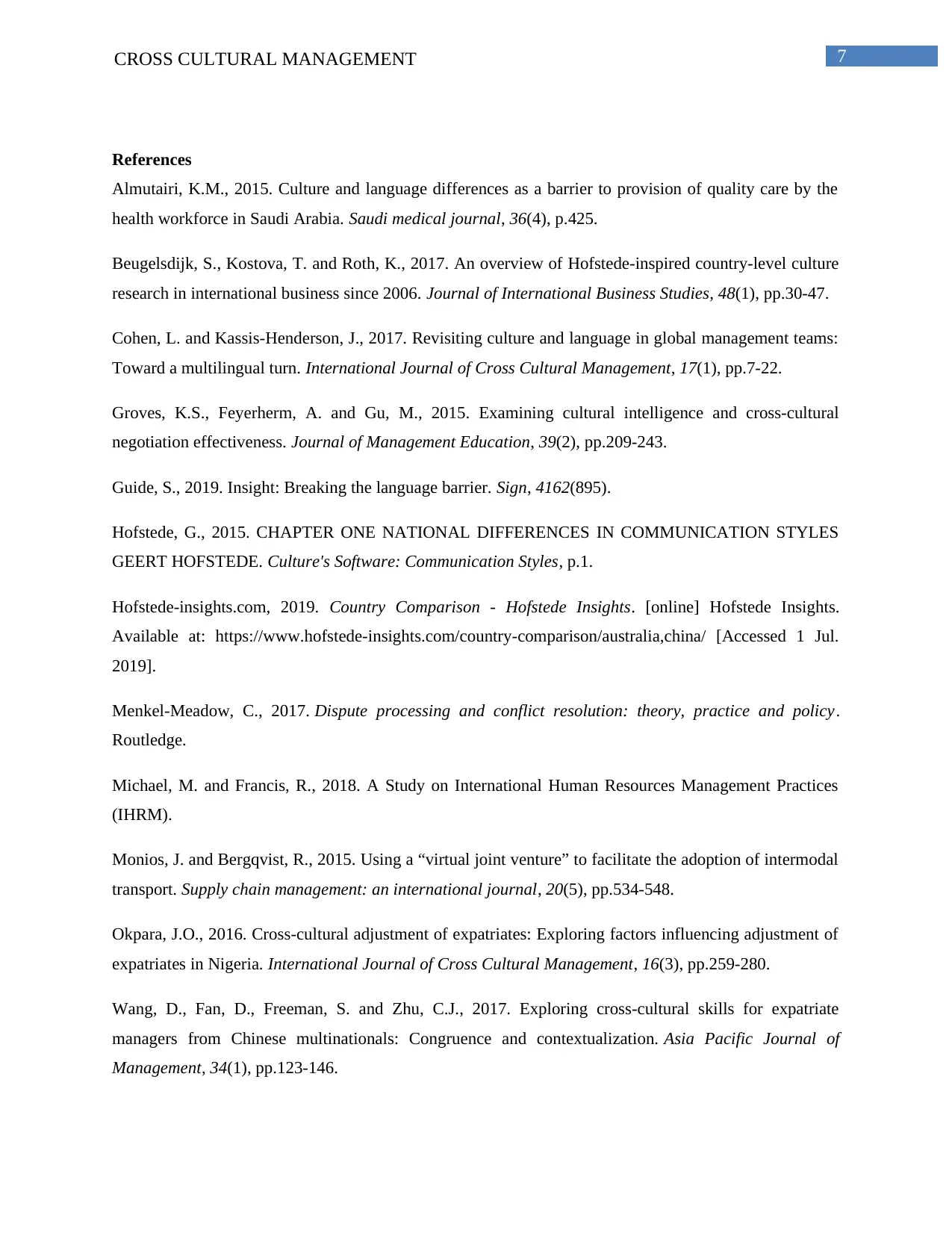
7CROSS CULTURAL MANAGEMENT
References
Almutairi, K.M., 2015. Culture and language differences as a barrier to provision of quality care by the
health workforce in Saudi Arabia. Saudi medical journal, 36(4), p.425.
Beugelsdijk, S., Kostova, T. and Roth, K., 2017. An overview of Hofstede-inspired country-level culture
research in international business since 2006. Journal of International Business Studies, 48(1), pp.30-47.
Cohen, L. and Kassis-Henderson, J., 2017. Revisiting culture and language in global management teams:
Toward a multilingual turn. International Journal of Cross Cultural Management, 17(1), pp.7-22.
Groves, K.S., Feyerherm, A. and Gu, M., 2015. Examining cultural intelligence and cross-cultural
negotiation effectiveness. Journal of Management Education, 39(2), pp.209-243.
Guide, S., 2019. Insight: Breaking the language barrier. Sign, 4162(895).
Hofstede, G., 2015. CHAPTER ONE NATIONAL DIFFERENCES IN COMMUNICATION STYLES
GEERT HOFSTEDE. Culture's Software: Communication Styles, p.1.
Hofstede-insights.com, 2019. Country Comparison - Hofstede Insights. [online] Hofstede Insights.
Available at: https://www.hofstede-insights.com/country-comparison/australia,china/ [Accessed 1 Jul.
2019].
Menkel-Meadow, C., 2017. Dispute processing and conflict resolution: theory, practice and policy.
Routledge.
Michael, M. and Francis, R., 2018. A Study on International Human Resources Management Practices
(IHRM).
Monios, J. and Bergqvist, R., 2015. Using a “virtual joint venture” to facilitate the adoption of intermodal
transport. Supply chain management: an international journal, 20(5), pp.534-548.
Okpara, J.O., 2016. Cross-cultural adjustment of expatriates: Exploring factors influencing adjustment of
expatriates in Nigeria. International Journal of Cross Cultural Management, 16(3), pp.259-280.
Wang, D., Fan, D., Freeman, S. and Zhu, C.J., 2017. Exploring cross-cultural skills for expatriate
managers from Chinese multinationals: Congruence and contextualization. Asia Pacific Journal of
Management, 34(1), pp.123-146.
References
Almutairi, K.M., 2015. Culture and language differences as a barrier to provision of quality care by the
health workforce in Saudi Arabia. Saudi medical journal, 36(4), p.425.
Beugelsdijk, S., Kostova, T. and Roth, K., 2017. An overview of Hofstede-inspired country-level culture
research in international business since 2006. Journal of International Business Studies, 48(1), pp.30-47.
Cohen, L. and Kassis-Henderson, J., 2017. Revisiting culture and language in global management teams:
Toward a multilingual turn. International Journal of Cross Cultural Management, 17(1), pp.7-22.
Groves, K.S., Feyerherm, A. and Gu, M., 2015. Examining cultural intelligence and cross-cultural
negotiation effectiveness. Journal of Management Education, 39(2), pp.209-243.
Guide, S., 2019. Insight: Breaking the language barrier. Sign, 4162(895).
Hofstede, G., 2015. CHAPTER ONE NATIONAL DIFFERENCES IN COMMUNICATION STYLES
GEERT HOFSTEDE. Culture's Software: Communication Styles, p.1.
Hofstede-insights.com, 2019. Country Comparison - Hofstede Insights. [online] Hofstede Insights.
Available at: https://www.hofstede-insights.com/country-comparison/australia,china/ [Accessed 1 Jul.
2019].
Menkel-Meadow, C., 2017. Dispute processing and conflict resolution: theory, practice and policy.
Routledge.
Michael, M. and Francis, R., 2018. A Study on International Human Resources Management Practices
(IHRM).
Monios, J. and Bergqvist, R., 2015. Using a “virtual joint venture” to facilitate the adoption of intermodal
transport. Supply chain management: an international journal, 20(5), pp.534-548.
Okpara, J.O., 2016. Cross-cultural adjustment of expatriates: Exploring factors influencing adjustment of
expatriates in Nigeria. International Journal of Cross Cultural Management, 16(3), pp.259-280.
Wang, D., Fan, D., Freeman, S. and Zhu, C.J., 2017. Exploring cross-cultural skills for expatriate
managers from Chinese multinationals: Congruence and contextualization. Asia Pacific Journal of
Management, 34(1), pp.123-146.
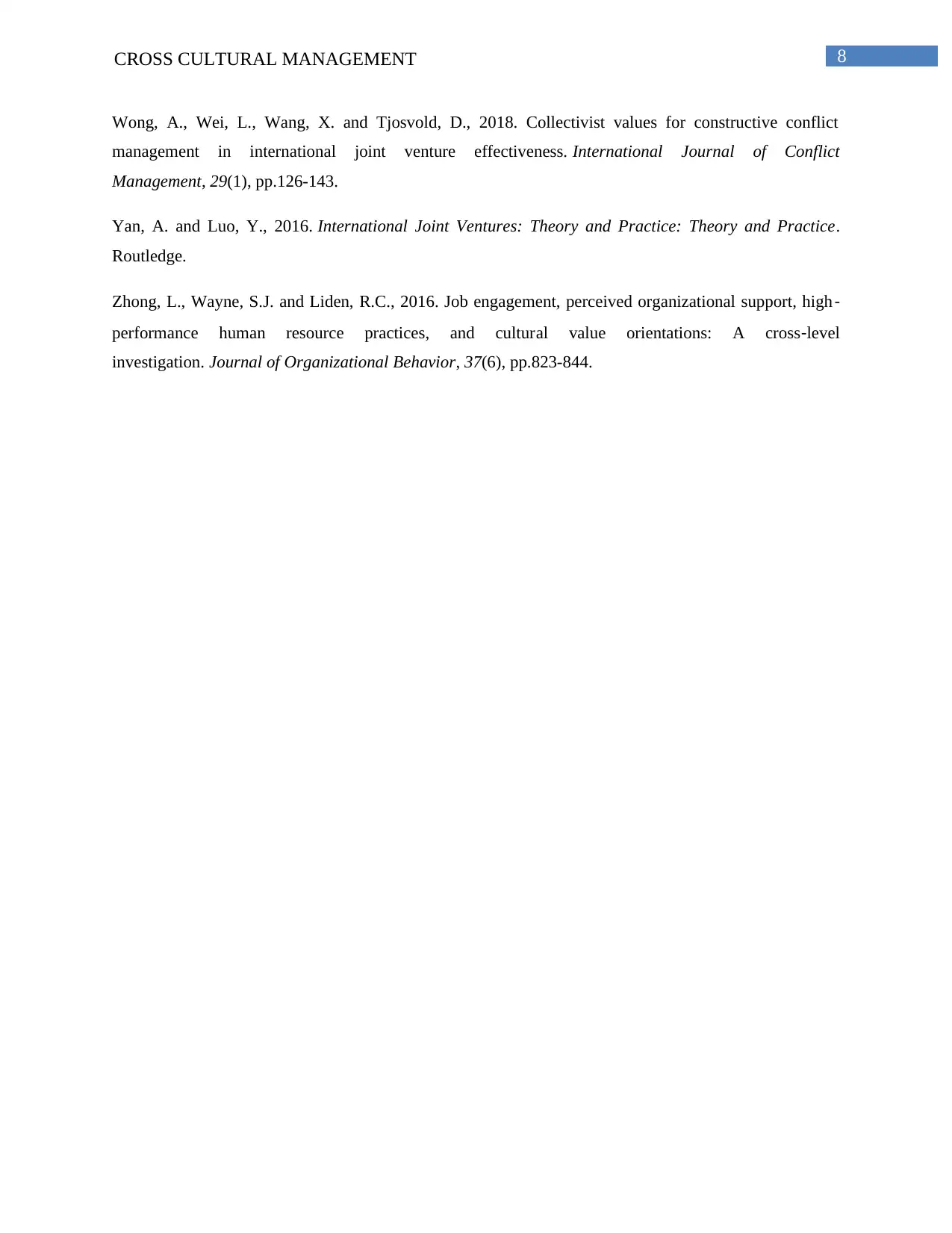
8CROSS CULTURAL MANAGEMENT
Wong, A., Wei, L., Wang, X. and Tjosvold, D., 2018. Collectivist values for constructive conflict
management in international joint venture effectiveness. International Journal of Conflict
Management, 29(1), pp.126-143.
Yan, A. and Luo, Y., 2016. International Joint Ventures: Theory and Practice: Theory and Practice.
Routledge.
Zhong, L., Wayne, S.J. and Liden, R.C., 2016. Job engagement, perceived organizational support, high‐
performance human resource practices, and cultural value orientations: A cross‐level
investigation. Journal of Organizational Behavior, 37(6), pp.823-844.
Wong, A., Wei, L., Wang, X. and Tjosvold, D., 2018. Collectivist values for constructive conflict
management in international joint venture effectiveness. International Journal of Conflict
Management, 29(1), pp.126-143.
Yan, A. and Luo, Y., 2016. International Joint Ventures: Theory and Practice: Theory and Practice.
Routledge.
Zhong, L., Wayne, S.J. and Liden, R.C., 2016. Job engagement, perceived organizational support, high‐
performance human resource practices, and cultural value orientations: A cross‐level
investigation. Journal of Organizational Behavior, 37(6), pp.823-844.
⊘ This is a preview!⊘
Do you want full access?
Subscribe today to unlock all pages.

Trusted by 1+ million students worldwide

9CROSS CULTURAL MANAGEMENT
Bibliography
Gomez, C. and Taylor, K.A., 2018. Cultural differences in conflict resolution strategies: A US–Mexico
comparison. International Journal of Cross Cultural Management, 18(1), pp.33-51.
Bibliography
Gomez, C. and Taylor, K.A., 2018. Cultural differences in conflict resolution strategies: A US–Mexico
comparison. International Journal of Cross Cultural Management, 18(1), pp.33-51.
Paraphrase This Document
Need a fresh take? Get an instant paraphrase of this document with our AI Paraphraser
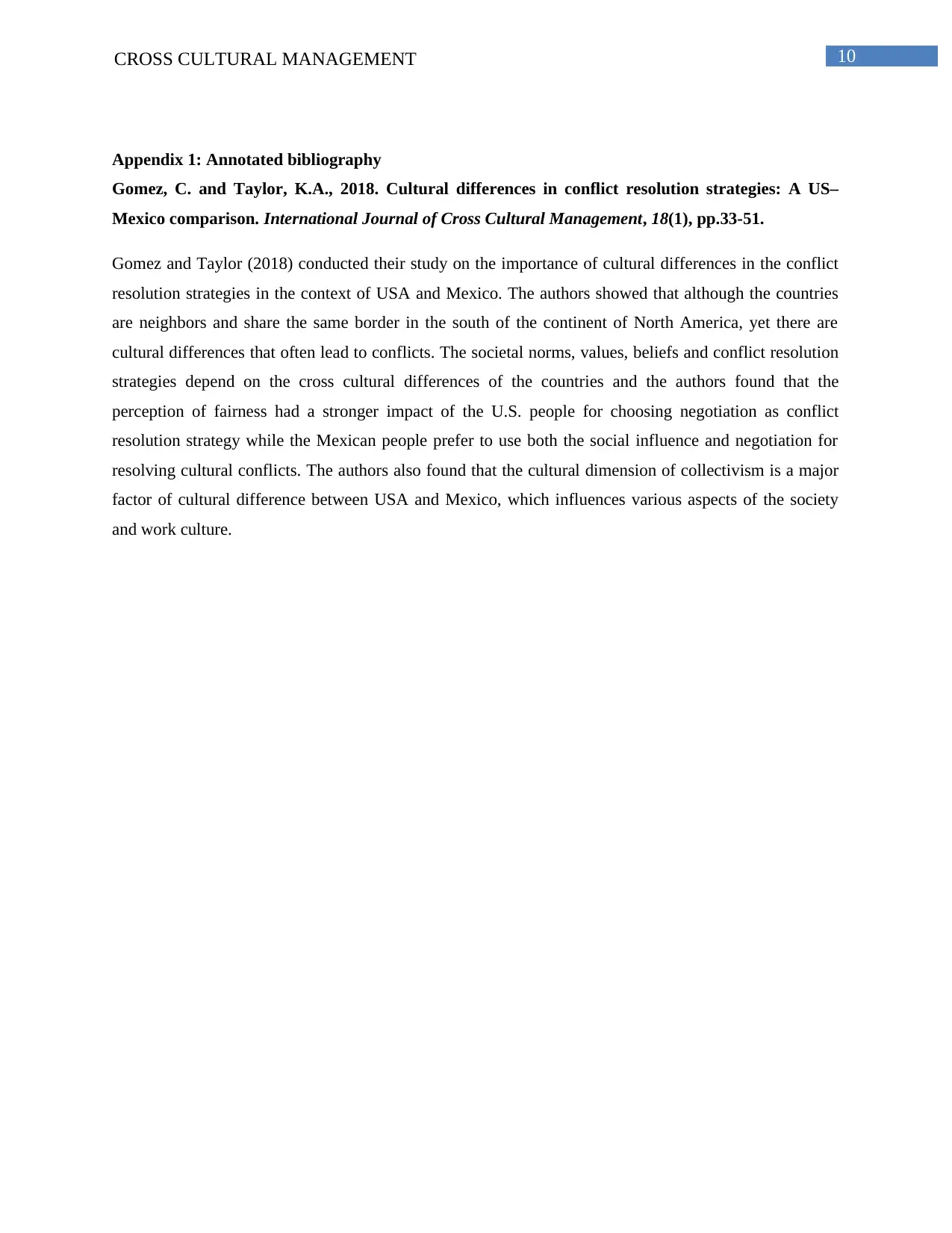
10CROSS CULTURAL MANAGEMENT
Appendix 1: Annotated bibliography
Gomez, C. and Taylor, K.A., 2018. Cultural differences in conflict resolution strategies: A US–
Mexico comparison. International Journal of Cross Cultural Management, 18(1), pp.33-51.
Gomez and Taylor (2018) conducted their study on the importance of cultural differences in the conflict
resolution strategies in the context of USA and Mexico. The authors showed that although the countries
are neighbors and share the same border in the south of the continent of North America, yet there are
cultural differences that often lead to conflicts. The societal norms, values, beliefs and conflict resolution
strategies depend on the cross cultural differences of the countries and the authors found that the
perception of fairness had a stronger impact of the U.S. people for choosing negotiation as conflict
resolution strategy while the Mexican people prefer to use both the social influence and negotiation for
resolving cultural conflicts. The authors also found that the cultural dimension of collectivism is a major
factor of cultural difference between USA and Mexico, which influences various aspects of the society
and work culture.
Appendix 1: Annotated bibliography
Gomez, C. and Taylor, K.A., 2018. Cultural differences in conflict resolution strategies: A US–
Mexico comparison. International Journal of Cross Cultural Management, 18(1), pp.33-51.
Gomez and Taylor (2018) conducted their study on the importance of cultural differences in the conflict
resolution strategies in the context of USA and Mexico. The authors showed that although the countries
are neighbors and share the same border in the south of the continent of North America, yet there are
cultural differences that often lead to conflicts. The societal norms, values, beliefs and conflict resolution
strategies depend on the cross cultural differences of the countries and the authors found that the
perception of fairness had a stronger impact of the U.S. people for choosing negotiation as conflict
resolution strategy while the Mexican people prefer to use both the social influence and negotiation for
resolving cultural conflicts. The authors also found that the cultural dimension of collectivism is a major
factor of cultural difference between USA and Mexico, which influences various aspects of the society
and work culture.
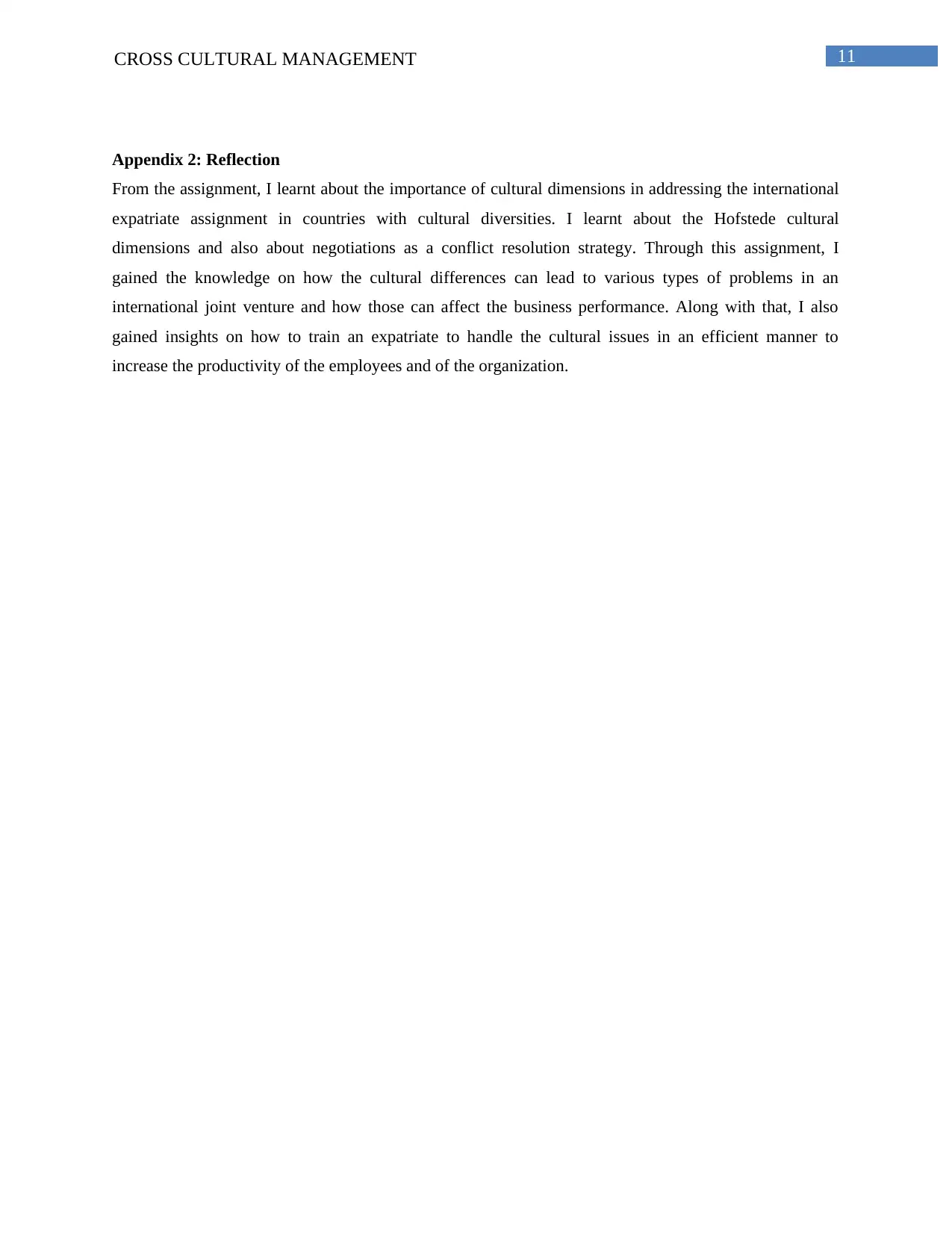
11CROSS CULTURAL MANAGEMENT
Appendix 2: Reflection
From the assignment, I learnt about the importance of cultural dimensions in addressing the international
expatriate assignment in countries with cultural diversities. I learnt about the Hofstede cultural
dimensions and also about negotiations as a conflict resolution strategy. Through this assignment, I
gained the knowledge on how the cultural differences can lead to various types of problems in an
international joint venture and how those can affect the business performance. Along with that, I also
gained insights on how to train an expatriate to handle the cultural issues in an efficient manner to
increase the productivity of the employees and of the organization.
Appendix 2: Reflection
From the assignment, I learnt about the importance of cultural dimensions in addressing the international
expatriate assignment in countries with cultural diversities. I learnt about the Hofstede cultural
dimensions and also about negotiations as a conflict resolution strategy. Through this assignment, I
gained the knowledge on how the cultural differences can lead to various types of problems in an
international joint venture and how those can affect the business performance. Along with that, I also
gained insights on how to train an expatriate to handle the cultural issues in an efficient manner to
increase the productivity of the employees and of the organization.
⊘ This is a preview!⊘
Do you want full access?
Subscribe today to unlock all pages.

Trusted by 1+ million students worldwide
1 out of 12
Related Documents
Your All-in-One AI-Powered Toolkit for Academic Success.
+13062052269
info@desklib.com
Available 24*7 on WhatsApp / Email
![[object Object]](/_next/static/media/star-bottom.7253800d.svg)
Unlock your academic potential
Copyright © 2020–2026 A2Z Services. All Rights Reserved. Developed and managed by ZUCOL.





